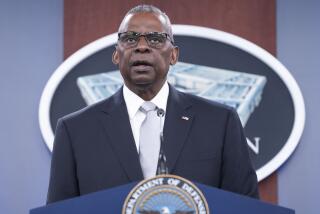Yanni’s Back--and Ready for a Group Hug With the World
- Share via
Anticipating election day, Americans need to examine the pieces of the puzzle to see how they fit together. They might first look at a commander in chief without much personal credibility. Next, they could ponder a military without much institutional credibility. Finally, they must factor in the presidential election.
The most startling news of last week was the apparent miscommunication about the precise sequence of events on Oct. 12, the day the U.S. warship Cole was blasted. If the ship was bombed when it first pulled into port at Aden, then responsibility for the loss of 17 sailors would go right to the top of the chain of command--to those who decided, as a matter of international power politics, to send the Cole to terrorist-teeming Yemen.
But on Oct. 20, eight days after the tragedy, the Navy admitted that the explosion occurred some 90 minutes after the Cole had docked; the suicide skiff was allowed to pull alongside the destroyer for no ostensible purpose. This information shifts the onus of responsibility downward and out of Washington, to, most obviously, the captain of the Cole.
That’s good news for the White House, but what else will we learn about what really happened? And when?
On the same day, Oct. 20, the administration produced more good news. Ali Mohamed, a former member of Osama bin Laden’s al Qaeda terror network, confessed in a New York City courtroom to conspiring to bomb two U.S. embassies in East Africa that left 223 dead, including 12 Americans. Indeed, Mohamed told the judge how Bin Laden personally selected one of the targets. Bin Laden, based in Afghanistan, is a prime suspect in the Cole bombing, too. This looks like a slam-dunk for U.S. law enforcement: eyewitness links notorious suspect to unsolved crime.
Armed with this testimony, President Clinton surely will be inclined to strike against Bin Laden. But is Mohamed really a reliable witness or is he just telling prosecutors what they want to hear? And is the U.S. in a rush to retaliate, perhaps with an eye to domestic politics? Recent history is not reassuring. Consider, for example, what happened after the East African bombings.
Those blasts happened on Aug. 7, 1998. Thirteen days later, on Aug. 20, Clinton ordered the U.S. to strike back with cruise missiles, launched against two different targets: first, against Bin Laden’s Afghan encampment, and second, against an alleged chemical weapons factory in Khartoum, Sudan. The owner of the plant, a Saudi businessman, immediately protested that he had nothing to do with terrorism, that the facility made nothing more dangerous than aspirin.
Eight months later, the U.S. government quietly conceded as much; $24 million in compensation was forthcoming.
Why did the U.S. act so swiftly, only to get the Sudanese half of the act all wrong? Could that cruise-missiling have had anything to do with Clinton’s prospective impeachment? After all, on Aug. 17, 10 days after the East Africa bombings, Clinton went on national TV and admitted his affair with Monica Lewinsky. Three days later, the missiles rained down.
Assessments of the president’s motivations aside, it’s worth noting that the 1998 response to the East Africa bombing took 13 days. As of today, it’s been 12 days since the Cole bombing. Stay tuned.
Of course, Clinton is not the only president to discover that the use of force can change the subject. Coincidentally, Monday was the 17th anniversary of the bombing of the Marine barracks in Beirut, which left 241 Americans dead. And Wednesday is the 17th anniversary of the U.S. invasion of Grenada, which toppled a pro-Castro communist government in that Caribbean island. Could there have been a connection between the two? Could then-President Reagan have found it useful, on either a conscious or subconscious level, to layer over the tragedy of Beirut with the triumph of Grenada?
If Clinton orders a strike, will he be doing it for legitimate national security purposes, or will he be “wagging the dog” on behalf of, say, Al Gore and Hillary Rodham Clinton? Will Americans rally around the flag--and the Democrats--if he does? These are questions the voters will likely have to answer in the next two weeks.
More to Read
Sign up for Essential California
The most important California stories and recommendations in your inbox every morning.
You may occasionally receive promotional content from the Los Angeles Times.













